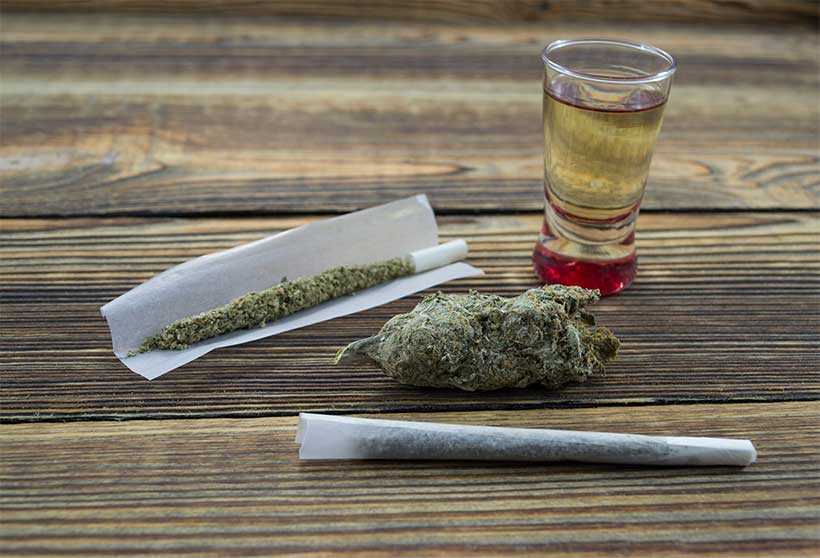Mixing Alcohol With Marijuana | Effects & Dangers

Medically Reviewed By: Manish Mishra, MBBS
Combining alcohol with marijuana, also known as “crossfading,” creates a number of side effects such as sedation and serious impairment. Both drugs depress the central nervous system (CNS) and can lead to breathing problems, blackouts, and other health issues.

When you mix alcohol and marijuana, also known as cannabis or weed, a number of serious side effects may occur. Marijuana use that’s combined with alcohol abuse increases the risk of certain dangers like severe impairments, accidents, and overdose.
Marijuana is classified as a central nervous system (CNS) depressant which, when combined with alcohol consumption, can lead to an increase in impairment and sedation. Tetrahydrocannabinol (THC) is the chemical in weed that creates sedative effects.
The ethanol in alcohol can increase the effects of this chemical in those smoking weed or eating marijuana edibles.
Effects Of Mixing Alcohol & Marijuana
Drinking alcohol and smoking marijuana causes side effects when taken separately. When taken together, these side effects may become more pronounced, creating more serious effects in both the short-term and long-term.
According to the National Institute on Drug Abuse (NIDA), the effects of alcohol and marijuana use may include:
- cognitive impairment
- vomiting
- blackouts
- engaging in risky behavior
- dizziness
- impairment
Some of the general effects of marijuana, which may be increased when combined with alcohol use, consist of:
- euphoric sensations
- distorted perceptions
- sensory and time perception
- difficulty with memory
- loss of coordination
Green Out
Additionally, a condition known as a “green out” can occur, in which a person experiences panic attacks, nausea, and sweating. Those smoking weed and participating in the use of alcohol may see these side effects exacerbated due to multiple substances in your system.
Dangers Of Mixing Weed With Alcohol
Although marijuana may be legalized recreationally in some parts of the United States, it continues to be classified as an illicit drug in other areas. Combined with alcohol, it can lead to a number of dangers.
Severe Sedation & Impairment
The effects of THC and alcohol together can increase sedation and impairment in the short-term. However, short-term effects can range in severity depending on the THC levels and alcohol levels in the body.
For instance, those who participate in heavy or binge drinking over a long period of time or those who consume a large amount of alcohol within a short time may notice differences in side effects, including other concerns such as falls or accidents.
Accidents
Accidental drownings, homicides, or suicides can occur if a person becomes severely impaired while drinking alcohol. In addition to this, motor vehicle accidents have an increased risk of taking place if a person gets behind the wheel after drinking.
According to the Substance Abuse and Mental Health Services Administration (SAMHSA), those who are high on marijuana while driving may experience decreased coordination and lane weaving.
This type of substance use can combine into life-threatening accidents which can impact not only you, but those around you.
Alcohol Poisoning
While a marijuana overdose may be unlikely, alcohol poisoning can occur. Marijuana may also play a part in decreased breathing due to the slowed breathing which occurs in those abusing any type of central nervous system (CNS) depressant.
Combining certain drugs can lead to an increased risk of overdose. According to the National Institutes of Health (NIH), some of the symptoms of an alcohol overdose include:
- seizures
- cardiovascular issues
- vomiting
- breathing problems such as respiratory depression
- low body temperature
- clammy skin
- confusion
- slowed heart rate
- brain damage
An overdose can be life-threatening. If you suspect a loved one is experiencing an overdose, contact 911 immediately and seek urgent medical assistance.
Long-Term Effects
Those who engage in this drug use may develop serious health problems including memory loss, seizures, and hallucinations if marijuana and alcohol are taken during a long-term basis.
Serious withdrawal symptoms may take place if a person has participated in alcohol or cannabis use for extended periods of time. Withdrawal symptoms a person may experience include:
- irritability
- sleeping problems
- cravings for the substances
- decreased appetite
- tremors
- seizures
- hallucinations
Marijuana & Alcohol Addiction Treatment
If you or a loved one struggle with marijuana or alcohol abuse, substance abuse treatment centers can help. At Ohio Recovery Center, we offer medical detox, behavioral therapy, and other substance use disorder treatment services in an inpatient healthcare setting.
To learn more about our treatment options, please contact us today.
- Drug Enforcement Administration https://www.dea.gov/sites/default/files/2020-06/Marijuana-Cannabis-2020_0.pdf
- Food and Drug Administration https://www.fda.gov/news-events/public-health-focus/fda-and-cannabis-research-and-drug-approval-process
- National Institute of Health https://www.niaaa.nih.gov/publications/brochures-and-fact-sheets/understanding-dangers-of-alcohol-overdose
- National Institute on Drug Abuse https://archives.nida.nih.gov/news-events/nida-notes/2021/06/using-alcohol-and-marijuana-together-exacerbates-negative-consequences-in-young-adults
- Substance Abuse and Mental Health Services Administration https://www.samhsa.gov/marijuana

